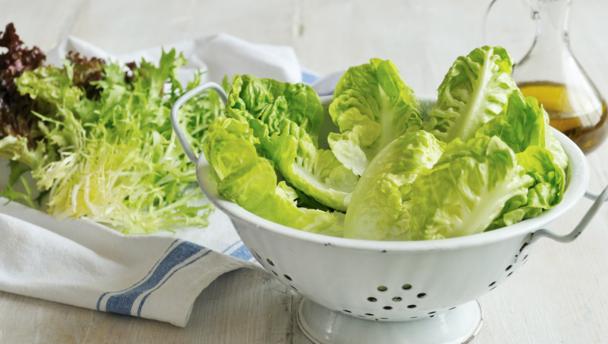

Lettuces are the most popular of all the salad leaves. They come in a wide variety of colours and shapes, from pale green to rich russet or bronze and with frilly leaves, round, thin or thick leaves.
 Lamb burgers with mint mayo and tomato relish
Lamb burgers with mint mayo and tomato relish
 Stir-fried oyster mushroom broth
Stir-fried oyster mushroom broth
 Globe artichoke salad
Globe artichoke salad
 Prawn cocktail
Prawn cocktail
 Simple layered salad
Simple layered salad
Buy lettuces that look bright, firm and crisp, with leaves that are not starting to brown at the edges and show no sign of slime or insect damage. Although lettuces are available virtually year-round, home-grown ones are at their best throughout the summer. Whole leaves attached to the butt of the lettuce will keep much longer than broken, chopped and washed leaves.
Store most lettuces loosely wrapped in a plastic bag in the salad drawer of the refrigerator. However, once wilted, lettuce will not recover even in the fridge. Most need to be used within a couple of days, although a few such as Iceberg and Little Gem can be kept up to a week. All salad leaves, whether bought or picked, will perk up after being soaked in cold water for a couple of hours before using. But don’t forget to dry them really well. Pre-packaged bags of lettuce leaves must be used quickly once opened as the leaves quickly spoil. Lettuces are unsuitable for freezing.
When preparing whole lettuces, discard any wilted outer leaves and gently wash and dry thoroughly on a clean tea towel or in a salad spinner. Lettuce is mostly eaten raw as part of a salad or as a garnish. It’s also added to sandwich fillings. In summer, when they are plentiful or you have a glut in the garden, use them in a creamy soup or braise them as a vegetable accompaniment.
To prevent decay, many pre-packed bags of salad leaves are soaked in a chlorine solution that removes most of the nutrient value and flavour. Look for organic bags of lettuce and/or those washed in spring water instead. Bags of prepared salads are also filled with MAP (Modified Atmosphere Packaging), a process whereby oxygen is removed in order to stop the leaves browning. Once the bags are opened, the leaves will wilt quickly.
Article by Clarissa Hyman
Type the ingredients you want to use, then click Go. For better results you can use quotation marks around phrases (e.g. "chicken breast"). Alternatively you can search by chef, programme, cuisine, diet, or dish (e.g. Lasagne).